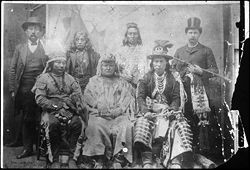| Revision as of 19:43, 7 June 2011 editDeflective (talk | contribs)Extended confirmed users28,441 edits IPAc-en conversion← Previous edit | Revision as of 17:44, 17 August 2011 edit undoValfontis (talk | contribs)Autopatrolled, Administrators80,851 editsm moved Walla Walla tribe to Walla Walla people: naming conventionsNext edit → |
| (No difference) | |
Revision as of 17:44, 17 August 2011
| This article needs additional citations for verification. Please help improve this article by adding citations to reliable sources. Unsourced material may be challenged and removed. Find sources: "Walla Walla people" – news · newspapers · books · scholar · JSTOR (January 2008) (Learn how and when to remove this message) |

Walla Walla (/ˌwɒləˈwɒlə/ WOL-ə-WOL-ə is a Sahaptin Native American tribe of the northwestern United States. The reduplication of the word expresses the diminutive form. The name "Walla Walla" is translated several ways but most often as "many waters."
Many Walla Walla live on the Confederated Tribes of the Umatilla Indian Reservation. The Walla Walla share land and a governmental structure with the Cayuse and the Umatilla tribes as part of the Confederated Tribes of the Umatilla. The reservation is located in the area Pendleton, Oregon, United States, near the Blue Mountains.
History
The people are a Sahaptin-speaking tribe which traditionally inhabited the Columbia River region of the northwestern United States. The Walla Walla occupied the territory along the Walla Walla River and along the junction of the Snake and Columbia Rivers in a territory that is now part of northern Oregon and southeastern Washington state in the United States before the coming of white settlers.
The Walla Walla encountered the Lewis and Clark Expedition both in 1805, during their trip down the Columbia River, and in 1806 during their return upriver. The Americans were welcomed warmly by the Walla Walla chief Yellepit (whose name is also spelled Yelleppit and Yellepitt). Yellepit's village was on the Columbia River near the mouth of the Walla Walla River. Lewis and Clark stayed for several days in April, 1806. Various presents were exchanged and goods traded. Notably, Yellepit presented Clark with a white horse. The chief requested a copper kettle in return, but the Americans had already given away all their kettles, so Clark gave Yellepit his own sword, along with a quantity of gunpowder and musket balls. Lewis and Clark also gave Yellepit a peace medal engraved with a portrait of Thomas Jefferson, to be worn around the neck, and a small American flag.
The next non-native to reach the Walla Walla region was David Thompson of the Canadian-British North West Company, who arrived in 1811. Thompson had placed a pole at Snake River junction with the Columbia, about five miles upriver from Yellepit's village. Thompson attached a letter to the pole claiming the territory for the British Crown and stating that the North West Company intended to build a trading post at the site. Continuing downriver, Thompson stopped at Yellepit's village and discovered the American "claims" in the form of Yellepit's flag and medal.
Neither Lewis and Clark or Thompson had much power to actually lay claim to the region, rather these acts and tokens served more like reminders of each nation's activities in the region. Thompson's pole and letter was intended for the traders of the Pacific Fur Company, an American rival to the North West Company. Thompson found Yellepit very friendly and intelligent, and the two talked at length. Notwithstanding his friendship with the Americans, Yellepit was very supportive of the idea of Canadians setting up a trading post nearby. Thompson decided that the junction of the Snake River with the Columbia would be an excellent place for a trading post. For various reasons no such post was built until 1818, when the North West Company established Fort Nez Perces at the mouth of the Walla Walla River.
See also
- James Lavadour, Walla Walla painter and printmaker, b. 1951
- Yellow Bird
- Dan Henderson, Olympic Wrestler and Mixed Martial Artist, b. 1970
References
- "Indian Names Of Places." Native American Glossary. (retrieved 24 March 2011)
- Walla Walla Indians, Lewis and Clark, PBS
- Yelleppit and the Walla Walla, The Oregon History Project
- Nisbet, Jack (1994). Sources of the River: Tracking David Thompson Across Western North America. Sasquatch Books. pp. 202–203. ISBN 1-57061-522-5.